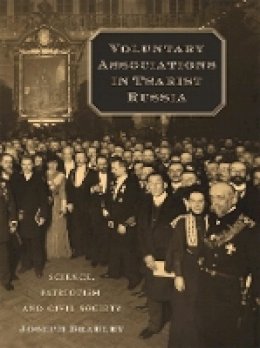
Voluntary Associations in Tsarist Russia: Science, Patriotism, and Civil Society
Joseph Bradley
On the eve of World War I, Russia, not known as a nation of joiners, had thousands of voluntary associations. Joseph Bradley examines the crucial role of voluntary associations in the development of civil society in Russia from the late eighteenth to the early twentieth century.
Russians populated a growing public sphere with societies based on the model of the European enlightenment. Owing to the mission of such learned associations as the Free Economic Society, the Moscow Agricultural Society, and the Russian Geographical Society, civil society became inextricably linked to patriotism and the dissemination of scientific knowledge. Although civil society and the autocratic state are often described as bitter rivals, cooperation in the project of national prestige and prosperity was more often the rule. However, an increasing public assertiveness challenged autocratic authority, and associations became a focal point of a contradictory political culture: they fostered a state-society partnership but at the same time were a critical element in the effort to emancipate society from autocracy and arbitrary officialdom.
Product Details
About Joseph Bradley
Reviews for Voluntary Associations in Tsarist Russia: Science, Patriotism, and Civil Society
Gary M. Hamburg, Claremont McKenna College Bradley adds significantly to our understanding of social processes and state-society relations in tsarist Russia. Educated Russians seized opportunities provided by the country's need for science and education and within the constraints maintained by the regime, they created something plausibly described as civil society. A major strength of the book is the consistent comparison with associational activity in Europe. Bradley makes an important contribution in showing that nineteenth-century Russia was not as different from its Western neighbors as many less well-documented accounts suggest.
Harley Balzer, Georgetown University This outstanding book presents an important new perspective on prerevolutionary Russian social and political history through its focus on private nongovernmental associations. While most other scholars have emphasized the paucity of voluntary associations and the overwhelming dominance of the state throughout Russian history, this exemplary study convincingly rebuts those viewpoints and argues that by the end of the 19th century, the burgeoning network of associations and societies had created the institutional basis for civil society in Russia.
N. M. Brooks
Choice
